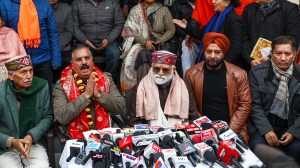The weight of the world
No, he does not croon Amitabh Bachchan's Coolie number. No glycerine sweat drops, no pretence of heaving luggage items that are actually fea...

No, he does not croon Amitabh Bachchan8217;s Coolie number. No glycerine sweat drops, no pretence of heaving luggage items that are actually featherweight, no relaxing in AC greenrooms after the shot.
For Babban Chimaji Bhambhure, porter number 101 at the Pune Railway Station, it8217;s the real stuff. Catching his breath after a balancing act with two crammed suitcases on his head and bulging bags slung across his shoulders, he sits in a cool corner of the platform and fans himself with his red turban cloth.
Descending from a train that got him to the city from his village way back in 1962, little did Bhambhure know that this very venue of the railway station would become his place of work 8220;karmabhoomi8217;8216; as he eloquently puts it. Reviewing the past three decades, he wistfully realises his years have been spent watching people come and go, while he stands by the moving trains8230; and then shrugs out of his reverie with a philosophical 8220;that8217;s destiny.8221;
8220;There has been a lot of change in my working life. The most significant one being the formation of our railway porters8217; union and our registration with the railway body. That has regularised many aspects of work 8211; the prices we charge, getting some medical reimbursement, the allocation of trolleys. Earlier the younger coolies would not even help the older ones lug heavy stuff. But with the forming of the association has come a sense of fraternity,8221; he points out.
But these benefits cannot ease out the insecurity resulting out of no fixed income. 8220;Almost every job assures the worker of a salary, our8217;s does not. We just have to count our earnings at the end of the day 8211; at times it8217;s as much as Rs 100, at times it8217;s zilch. The rates we charge depends on the number of luggage items. A trolley costs more. Periodically, depending upon the inflation, the rates are reviewed.8221;
Working in shifts allocated by their association, the 250-odd porters at the Pune Railway Station have a 10-hour duty, with two days off in the month. 8220;I work from 8 am, beginning the day by reporting at the association office. One Sunday I do a double duty, the next Sunday I am on leave,8221; explains Bhambhure. 8220;It8217;s tough work, with a great deal of physical strain. We take care of ourselves, ensuring that we do not lift more weight than we can carry.8221;
And along with handling people8217;s baggage comes dealing with the persons themselves. 8220;If we do not behave politely or accept what they have to pay us, they will hire another porter. It8217;ll be our loss, so we have to be careful not to antagonise them.8221; He adds that all travellers must make a note of the identity billa number of the porter, in case of any eventuality. 8220;But that does not happen. We know we have to work here for many years. They trust us with their luggage. We cannot afford to break that faith.8221; Words as true as the sweat on his brow.
Top
- 01
- 02
- 03
- 04
- 05































